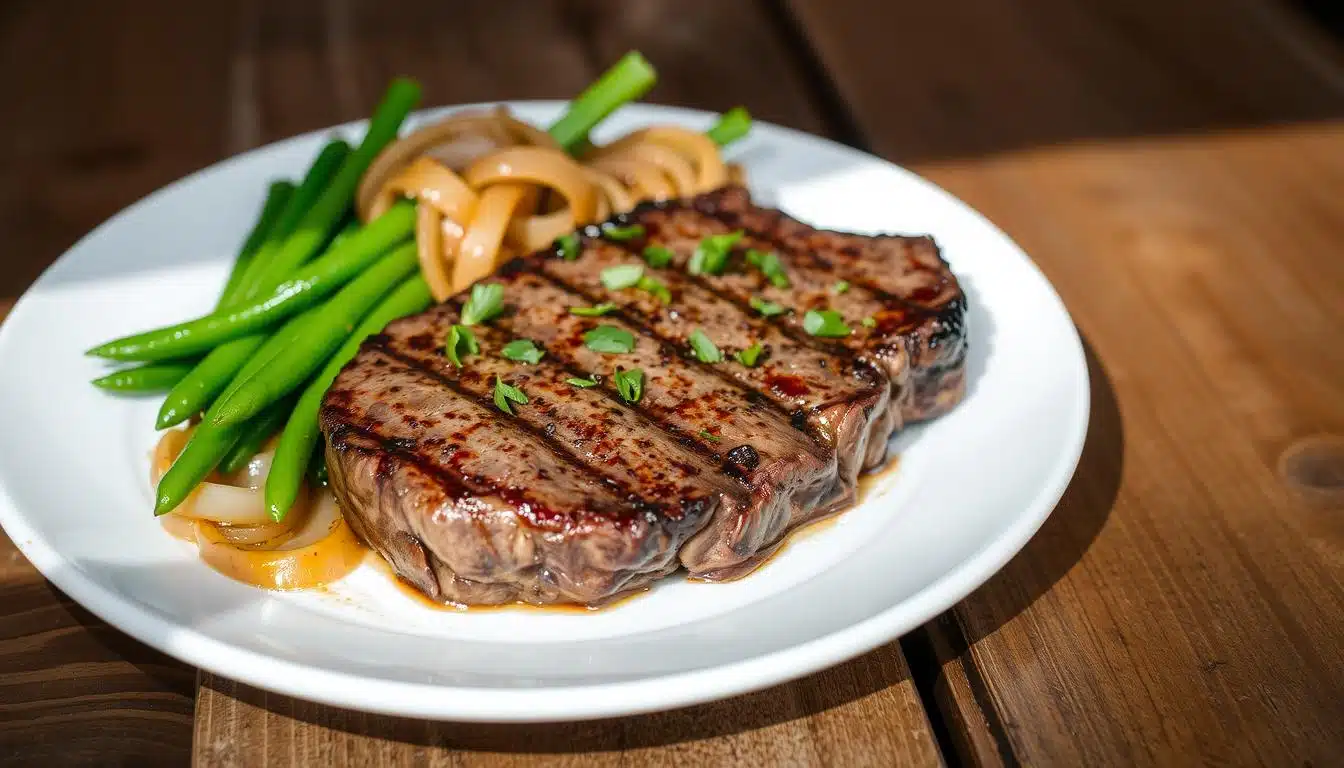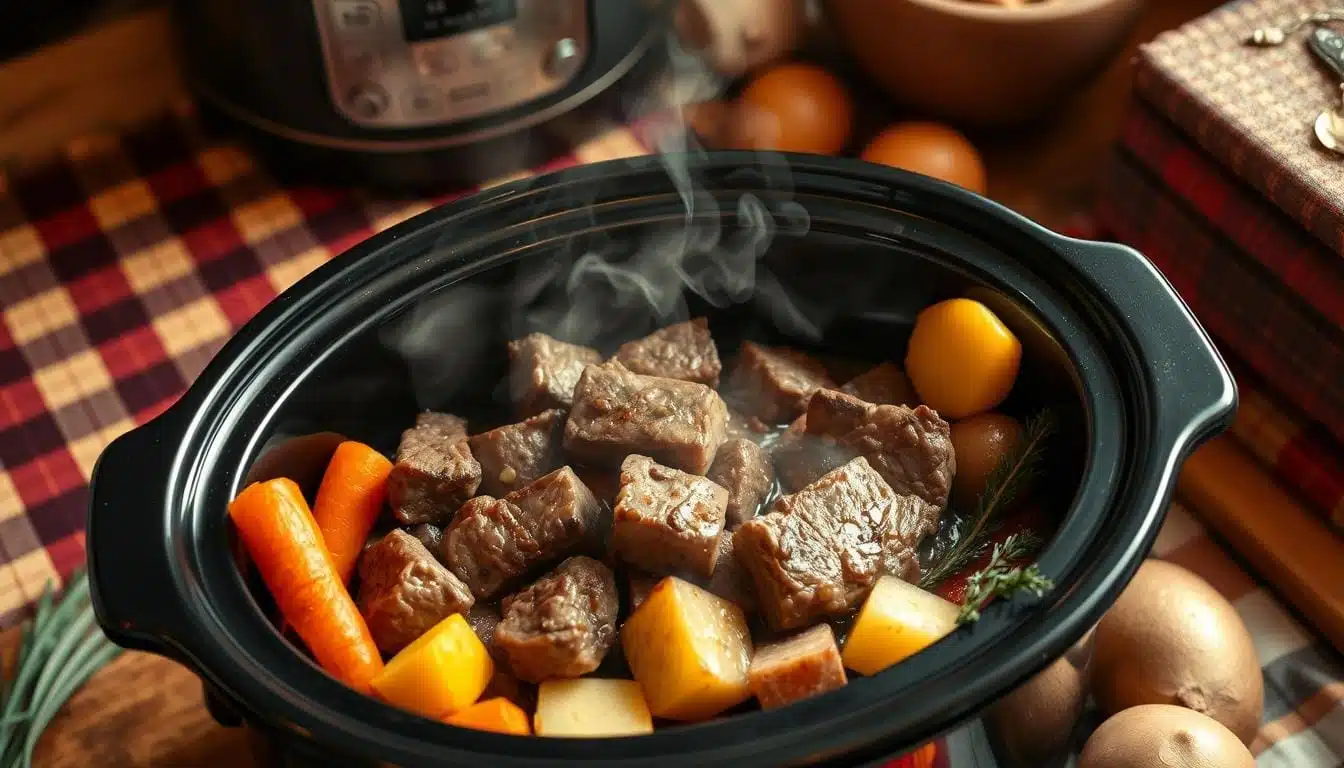Tender & Flavorful Cowboy Steak Recipe: Secrets to Perfection
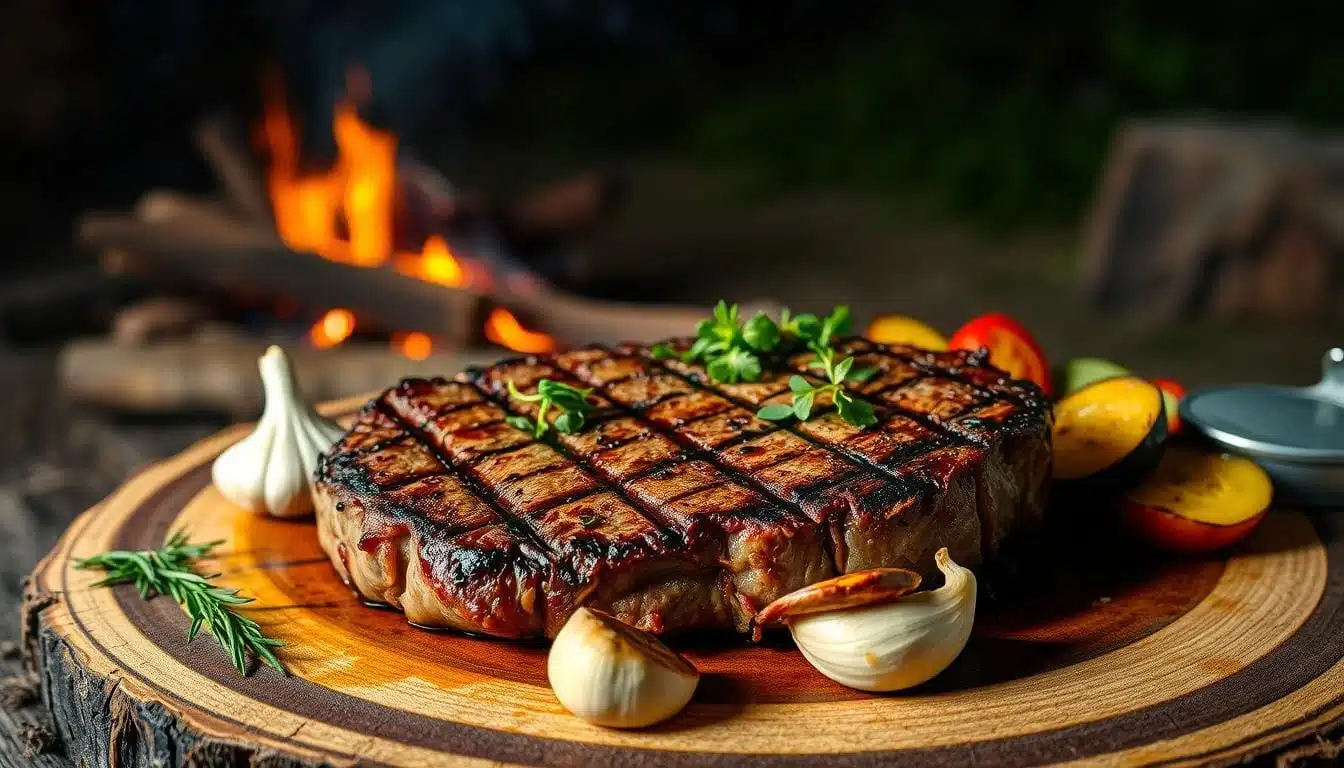
What makes a cowboy steak perfect, and how can you make it tender and flavorful at home? A cowboy steak is famous for its rich taste and soft texture. It’s a favorite among steak fans, and the right recipe can make it even better.
To enjoy a cowboy steak’s full flavor, cook it to medium-rare or medium. The right recipe can help you get it just right. But what are the secrets to a tender and flavorful cowboy steak? And what makes a recipe stand out?
Table of Contents
What Makes a Cowboy Steak Special
A cowboy steak, also known as a cowboy ribeye or cowboy cut steak, comes from the rib primal. It’s famous for its rich taste and soft texture. This makes it a favorite for special events. The steak’s bone-in structure adds to its taste and feel.
This steak is over 2″ thick and weighs more than 2.5 pounds. It has a short bone section that’s been cleaned, called “Frenching.” This makes the steak look unique and boosts its flavor. You can grill, broil, or pan-sear it. It’s often served with seasonings and sauces to match its rich taste.
- Rich marbling, which adds to its tenderness and flavor
- A short length of exposed bone, which is cleaned of meat and fat through the Frenching process
- A thick cut, typically over 2″ thick, which helps to retain its juices and flavor
In summary, a cowboy steak is a special and tasty meat. It’s great for special occasions or for those wanting to try something new. Its rich flavor and soft texture make it a crowd-pleaser.
| Steak Type | Thickness | Weight | Bone Length |
|---|---|---|---|
| Cowboy Steak | Over 2″ | Over 2.5 pounds | Short |
| Tomahawk Steak | Over 2″ | Over 2.5 pounds | Long |
Selecting the Perfect Cowboy Steak
Choosing the right cut of meat is key when cooking cowboy steak. Look for even marbling and a well-trimmed bone. This ensures the steak is tender and full of flavor. A clean bone also helps prevent overcooking.
Quality is another important factor. USDA Prime grade cowboy steaks are rich in flavor and tender. They’re a favorite among steak lovers. USDA Select grade steaks are leaner and more affordable but might not be as juicy or flavorful.
- Even marbling throughout the steak
- A well-trimmed bone to prevent overcooking
- A good balance of flavor and tenderness
- A high-quality meat grade, such as USDA Prime
By focusing on these factors, you can choose a high-quality cowboy steak. This will help you cook cowboy steak that’s both delicious and memorable. Whether you’re an experienced cook or just starting, picking the right steak is crucial for a great meal.
Essential Tools and Equipment for Preparation
To get a perfectly grilled cowboy steak, you need the right tools. A good recipe starts with quality equipment. This includes a reliable grill or grill pan, a meat thermometer, and tongs or a spatula.
For grilling, a cast-iron skillet or oven-proof pan is great. These pans handle high temperatures well and cook evenly. Also, a digital meat thermometer, like the Thermoworks, is key for the perfect doneness.
Grilling Equipment
Other important tools for a cowboy steak are a sharp knife and a heavy cutting board. A Victorinox-Forschner boning knife is good for slicing. A wooden cutting board is better for knives than plastic ones. For extra flavor, use a spice grinder for custom seasonings.
Temperature Tools
A cowboy steak recipe needs the right temperature tools. A meat thermometer is crucial for safe internal temperature. Choose a thermometer like the Thermoworks for accuracy. With the right tools, you’ll make a delicious grilled cowboy steak that will wow everyone.
Understanding Meat Grades and Marbling
When cooking cowboy steak, knowing about meat grades and marbling is key. Meat grades show the meat’s quality. Marbling is the fat in the steak. More marbling means a tender and tasty steak.
The Beef Marbling Score (BMS) goes from 1 to 12. Scores 1-3 mean little marbling, while 10-12 is a lot. For cowboy beef, a high BMS is best for flavor and tenderness. The USDA grades, like Prime, Choice, and Select, also look at maturity, texture, color, and marbling.
When picking a cowboy steak, consider these factors:
- Marbling score: A higher score means more fat, making the steak tender and flavorful.
- USDA grade: Prime, Choice, and Select grades vary in quality and marbling.
- Cut of beef: Different cuts, like ribeye, filet mignon, and strip steak, need specific cooking methods for the best taste and texture.
To get the best results with cowboy steak, choose cuts with 6-12 marbling or USDA Prime. This ensures maximum flavor and juiciness. By understanding meat grades and marbling, you can pick the perfect cowboy steak for a memorable meal.
Preparing Your Cowboy Steak for Cooking
To make the perfect cowboy steak recipe, start by preparing your steak right. This means thawing it, seasoning it, and controlling the temperature. Learning how to cook cowboy steak begins with thawing the steak first.
Thawing your cowboy steak slowly and evenly is key. You can thaw it in the fridge for 24 hours or in cold water. After thawing, season it with salt, pepper, and thyme to boost its flavor.
Proper Thawing Methods
Choosing the right thawing method is crucial. Thaw the steak in the fridge for at least 24 hours. This slow thaw keeps the steak’s texture and flavor intact.
Seasoning Techniques
Seasoning is a must for your cowboy steak. Use salt, pepper, and spices to add flavor. For a richer taste, try a cowboy steak seasoning blend like Chicago Steak Seasoning.
Temperature Considerations
Controlling the temperature is key when cooking a cowboy steak. Let the steak come to room temperature before cooking. For medium-rare, aim for 130 degrees. Medium and medium-well are 140 and 150 degrees, respectively.
By following these steps, you’ll master the art of cowboy steak recipe. Whether you’re an expert or a beginner, learning how to cook cowboy steak is a must for steak enthusiasts.
| Steak Doneness | Internal Temperature |
|---|---|
| Rare | 120-130 degrees |
| Medium-Rare | 130-135 degrees |
| Medium | 140-145 degrees |
| Medium-Well | 150-155 degrees |
The Perfect Cowboy Steak Marinade
A good marinade can make a cowboy steak taste better and be more tender. It’s a key part of the best cowboy steak recipe. A good marinade includes soy sauce, lemon juice, olive oil, and more.
When making a marinade, it’s important to mix flavors and textures right. Acidic ingredients like lemon juice and Worcestershire sauce tenderize the steak. Olive oil and soy sauce add richness. Garlic, Italian seasoning, pepper, and salt boost the flavor.
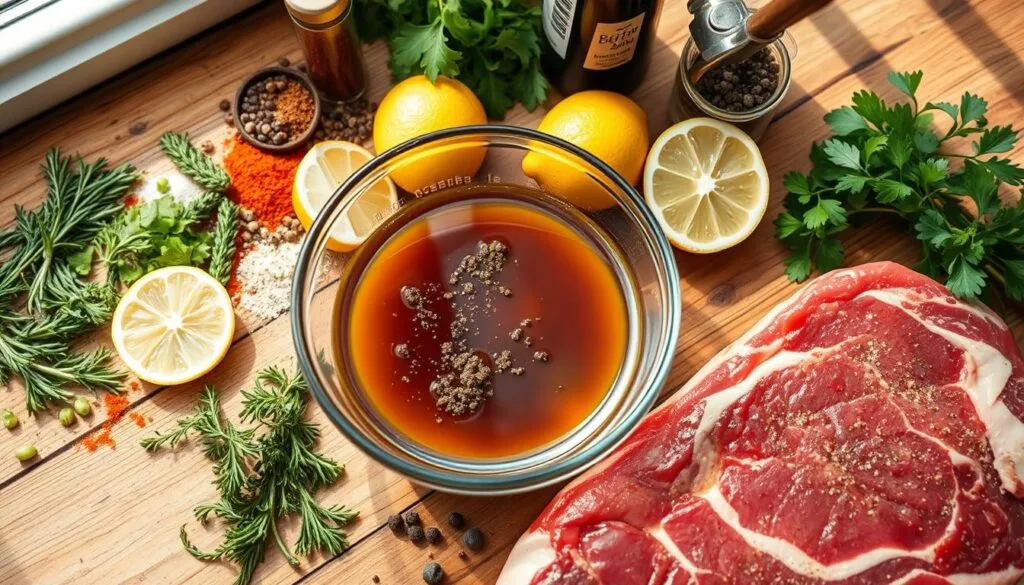
To make the perfect marinade for your cowboy steak, follow this simple recipe:
- 2 tablespoons soy sauce
- 1 tablespoon lemon juice
- 1 tablespoon olive oil
- 1 teaspoon Worcestershire sauce
- 1 teaspoon minced garlic
- 1 teaspoon Italian seasoning
- Salt and pepper to taste
This marinade recipe is a key part of the best cowboy steak recipe. It can be used for many occasions. By using this marinade, you’ll make a delicious and tender steak that will impress everyone.
| Marinade Ingredients | Quantity |
|---|---|
| Soy sauce | 2 tablespoons |
| Lemon juice | 1 tablespoon |
| Olive oil | 1 tablespoon |
| Worcestershire sauce | 1 teaspoon |
| Minced garlic | 1 teaspoon |
| Italian seasoning | 1 teaspoon |
Grilling Techniques for Optimal Results
Grilling a cowboy steak, like a cowboy ribeye, needs focus and the right methods. It’s key to know the different grilling ways. These include direct heat, indirect heat, and reverse searing.
Before grilling, let the steak warm up to room temperature for an hour. This helps it cook evenly. Sear each side for 2-3 minutes to get a nice crust. The grill should be at 500F (260C) for the best sear.
Direct Heat Method
The direct heat method cooks the steak right over the heat. It’s great for a crispy crust and juicy inside. For a medium-rare, the steak should hit 130F (54C) inside.
Indirect Heat Method
The indirect heat method cooks the steak away from the heat. It’s best for thicker steaks, like a 2-inch cowboy ribeye, to avoid burning. Grill a 2-inch steak for 18–20 minutes for medium-rare.
Reverse Searing Approach
The reverse searing method cooks the steak in a hot skillet then finishes it in the oven. It creates a crispy crust and cooks the steak to your liking. The steak should rest at 135F (57C) after cooking.
By using these grilling techniques, you can make a delicious grilled cowboy steak, like a cowboy ribeye.
| Grilling Method | Recommended Time | Recommended Temperature |
|---|---|---|
| Direct Heat | 10-12 minutes for medium-rare | 500F (260C) |
| Indirect Heat | 18-20 minutes for medium-rare | 400F (200C) |
| Reverse Searing | 10-12 minutes for medium-rare | 500F (260C) |
Alternative Cooking Methods
Grilling is not the only way to cook a cowboy steak. Pan-searing and oven-roasting are great alternatives. They offer unique benefits for a delicious and tender steak.
Some benefits of these methods include:
- Easy to cook indoors
- Less equipment required
- Can be cooked in a variety of settings
Cooking cowboy steak in the oven can make it tender and juicy. Season the steak with your favorite spices and bake at a medium-high temperature. Or, cowboy steak recipe can be pan-seared in a hot skillet with oil and butter for extra flavor.
The secret to success is to sear the steak first. Then, cook it slowly to get the perfect doneness. Use a thermometer to check the steak’s internal temperature.
In conclusion, alternative cooking methods are excellent for a cowboy steak. Whether you choose pan-searing or oven-roasting, you can make a delicious steak at home. Just follow a simple cowboy steak recipe and enjoy a tasty meal.
Temperature Guide for Different Doneness Levels
Understanding the temperature guide for different doneness levels is key when cooking a cowboy steak. Knowing how to cook a cowboy steak is crucial. A good cowboy steak recipe involves cooking the steak to a specific internal temperature for safety and tenderness.
The internal temperature of a steak shows its doneness. For instance, a rare steak is cooked to 120-130°F. A medium-rare steak is cooked to 130-135°F. To get the steak to the right doneness, using a meat thermometer is essential. This ensures the steak is cooked safely and to your liking.
Rare to Well-Done Guidelines
The temperature guide for different doneness levels is as follows:
- Rare: 120-130°F
- Medium-rare: 130-135°F
- Medium: 135-140°F
- Medium-well: 140-145°F
- Well-done: 145-150°F
Using Meat Thermometers
To get accurate temperature readings, a reliable meat thermometer is needed. A Thermapen ONE is a good choice. It gives fast and accurate readings. By following a trusted cowboy steak recipe and using a meat thermometer, you can cook a delicious steak every time.
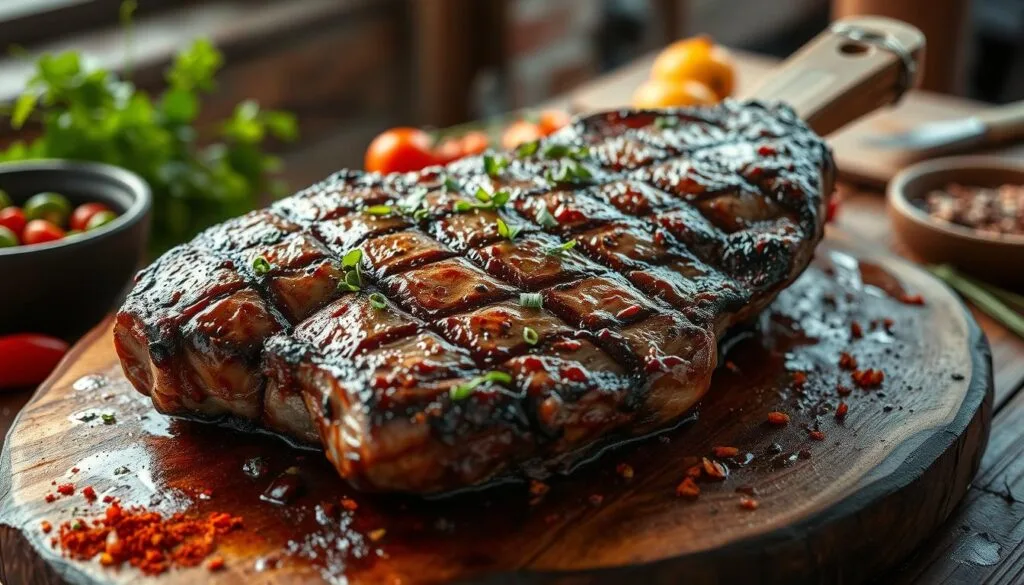
Resting and Carving Your Steak
After cooking your cowboy steak, let it rest for a few minutes. This step helps the juices spread evenly and keeps the steak tender. Studies show that resting for 5 minutes makes the steak’s outer layers reach 145°F, while the center stays at 125°F.
After 10 minutes, the steak cools down. Its edges reach 125°F, allowing them to soak up more liquid from the center.
When carving, use a sharp knife and cut against the grain. This method helps keep the juices in and the steak tender. Remember, the steak loses about 13% of its weight while cooking. But, resting it can reduce this loss to just 2% more.
To achieve a perfect cowboy ribeye, rest the steak for 5 minutes before serving. This ensures the internal temperature hits 135°F, perfect for medium-rare. Use a sharp knife to slice against the grain. A meat thermometer can also help check the steak’s internal temperature.
Here are some tips for resting and carving your cowboy steak:
* Let the steak rest for 5-10 minutes before carving
* Use a sharp knife to carve against the grain
* Check the internal temperature of the steak to ensure it is cooked to your desired level of doneness
* Slice the steak thinly to minimize the loss of juices
By following these tips, your cowboy steak will be tender, juicy, and perfectly cooked.
Signature Compound Butter Recipes
To make your cowboy steak recipe even better, try adding a special compound butter. This mix of butter, herbs, and spices brings a rich flavor to your steak. For a top-notch best cowboy steak recipe, create your own compound butter with butter, herbs, and spices.
Ree Drummond’s Cowboy Butter is a hit. It’s made with butter, parsley, garlic, black pepper, red pepper, lemon zest, and lemon juice. Soften the butter for an hour, then mix it with the seasonings. Shape it into a log for later use.
- Unsalted butter
- Dijon mustard
- Garlic cloves
- Fresh lemon zest
- Chopped chives and parsley
- Crushed red pepper flakes
- Ground cumin
- Smoked paprika
This compound butter has a creamy, citrusy, and spicy taste. You can use it warm as a sauce or chilled for grilling meats or veggies.
Keep your compound butter in an airtight container in the fridge for up to 2 weeks. You can also freeze it. Roll it in parchment paper, then wrap it in plastic wrap. It can be sliced and frozen for up to 3 months.
Perfect Side Dish Pairings
Choosing the right side dishes for a cowboy steak is key. Web sources suggest pairing it with mashed potatoes and grilled vegetables. These options bring out the rich taste of cowboy beef.
Some top side dishes for cowboy steak are:
- Grilled vegetables, used in 35% of recipes
- Salad, used in 40% of recipes
- Mashed potatoes, a classic choice for cowboy beef
A cowboy steak is perfect for group meals. The right side dishes make the meal complete. They boost the flavor of your cowboy steak and make the meal unforgettable.
Other great options include corn, rice, and roasted vegetables. The goal is to mix flavors and textures for a better dining experience.
| Side Dish | Percentage of Recipes |
|---|---|
| Grilled vegetables | 35% |
| Salad | 40% |
| Corn | 25% |
| Rice | 10% |
Troubleshooting Common Cooking Issues
When cooking a cowboy steak, knowing common problems is key. Issues like overcooking and flare-ups can happen. To avoid overcooking, a meat thermometer is essential. It helps ensure the steak reaches the perfect temperature.
The internal temperature should be between 120F and 150F. This depends on how done you like your steak.
Cooking a cowboy steak requires care, especially managing flare-ups. Flipping the steak often and cooking at lower heat helps. This prevents char and reduces harmful compounds.
Marinating the steak with lemon juice, onion, and garlic also helps. It reduces unwanted compounds.
Preventing Overcooking
- Use a meat thermometer to ensure the steak is cooked to the right temperature
- Cook the steak on lower heat levels to prevent char and reduce harmful compounds
- Regularly flip the steak to achieve even cooking
Managing Flare-Ups
Managing flare-ups is crucial. A grill mat or cast-iron skillet can help control flames. This prevents the steak from burning.
By following these tips and using the right tools, you can cook a perfect cowboy steak. It will be tender and full of flavor.
Fixing Seasoning Problems
Seasoning is vital when cooking a cowboy steak. Avoiding over-seasoning is a challenge. It’s important to taste the steak as you go and adjust the seasoning.
A good cowboy steak recipe balances flavors. It should have the richness of the meat and the brightness of the seasonings.
| Doneness Level | Internal Temperature |
|---|---|
| Rare | 120F |
| Medium-rare | 130F |
| Medium | 135F |
| Medium-well | 140F |
| Well-done | 150F |
By following these tips and using the right techniques, you can cook a perfect cowboy steak. It will be tender and flavorful. Whether you’re a seasoned chef or a beginner, cooking a cowboy steak is rewarding. With the right recipe, you’ll impress everyone.
Conclusion
Cooking a tasty cowboy steak is easy if you pay attention and know a few tricks. It’s all about picking a great steak, cooking it right, and letting it rest before cutting. This steak is thick, meant for sharing, and can feed two or one person.
A cowboy steak is a bone-in ribeye, which adds a rich flavor. The bone makes the steak even more flavorful. You can grill, pan-sear, or reverse-sear it, each method giving a unique taste. By following the advice in this article, you’ll make a cowboy steak recipe that will wow everyone.
With some practice, you’ll get better at cooking cowboy steak. You’ll learn to avoid common mistakes like toughness and dryness. Whether you’re experienced or new, making a cowboy steak is rewarding. With the right skills, you’ll get it just right.
People also ask
What is a cowboy steak and how is it defined?
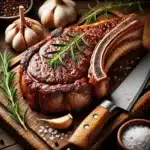
A cowboy steak comes from the rib primal. It has a bone-in structure and lots of marbling. This makes it tender and full of flavor.
How do I select the perfect cowboy steak for cooking?
Look for a steak with even marbling and a clean bone. Choose one that’s fresh and of high quality. Consider meat grades and marbling.
What are the essential tools and equipment needed to prepare a cowboy steak?
You’ll need a grill or grill pan, a meat thermometer, and tongs or a spatula. Also, a cast-iron skillet or oven-proof pan for grilled steak.
How do I prepare my cowboy steak for cooking?
First, thaw the steak properly. Then, season it with spices and herbs. Use a recipe as a guide and think about how to cook it.
What is the perfect marinade for a cowboy steak?
A good marinade uses spices, herbs, and acids. It tenderizes the steak and adds flavor. You can make your own or use a store-bought recipe.
What are the best grilling techniques for cooking a cowboy steak?
The best techniques include direct heat, indirect heat, and reverse searing. Each has its own benefits and drawbacks. They help achieve the best results for your steak.
What are the alternative cooking methods for a cowboy steak?
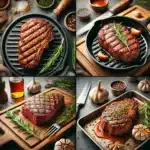
Other methods include pan-searing, oven-roasting, and slow cooking. Each has its own advantages and disadvantages. They can help cook your steak perfectly.
How do I ensure my cowboy steak is cooked to the right temperature?
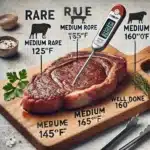
Use a meat thermometer to check the temperature. Follow the guide for different doneness levels. This ensures your steak is cooked just right.
How do I rest and carve my cowboy steak?
Let the steak rest for a few minutes before carving. This allows the juices to redistribute. Use a sharp knife to carve against the grain.
What are some signature compound butter recipes for a cowboy steak?
Try herb-infused or spicy compound butter recipes. They add flavor to the steak. Use a recipe as a guide to make your own.
What are the perfect side dish pairings for a cowboy steak?
Great side dishes include mashed potatoes, grilled vegetables, and salad. Choose based on your preferences and the steak’s flavor.
How do I troubleshoot common cooking issues with a cowboy steak?
To fix common issues like overcooking and flare-ups, use a meat thermometer. Cook to the right temperature. Consider using a grill mat or cast-iron skillet to manage flare-ups.


